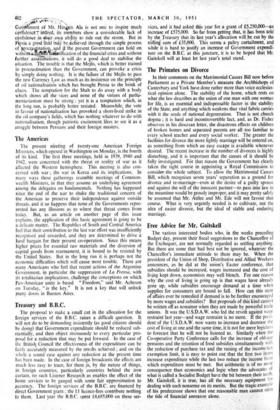Free Advice for Mr. Gaitskell
The various interested bodies who, in the weeks preceding Budget day, present their fiscal suggestions to the Chancellor of the Exchequer, are not normally regarded as settling anything. But there are some that had best not be ignored, whatever the Chancellor's immediate attitude to them may be. When the president of the Union of Shop, Distributive and Allied Workers announces, as he did at the union's Easter conference, that subsidies should be increased, wages increased and the cost of living kept down, economists may well blench. For one reason why the cost of living is going up is that wages have already gone up, while subsidies encourage demand at a time when supplies for consumers are bound to fall. How can this state of affairs ever be remedied if demand is to be further encouraged by more wages and subsidies? But proposals of this kind cannot be written off as nonsense when they are made by powerful trade unions. It was the U.S.D.A.W. who led the revolt against wage restraint last year—and wage restraint is no more. If the presi- dent of the U.S.D.A.W. now wants to increase and decrease the cost of living at one and the same time, it is not for mere logicians to forecast that he will not be listened to. Similarly when the Co-operative Party Conference calls for the increase of old-age pensions and the retention of food subsidies simultaneously with the reduction of purchase tax and the raising of the income-tax exemption limit, it is easy to point out that the first two items increase expenditure while the last two reduce the income from which expenditure must be met. But arithmetic is of no more consequence than economics and logic when the advocates of what is called a Socialist Budget have the bit between their teeth. Mr. Gaitskell, it is true, has all the necessary equipment for dealing with such nonsense on its merits. But the tragic example of his predecessor shows that one reasonable man cannot stem the tide of financial unreason alone.






























 Previous page
Previous page